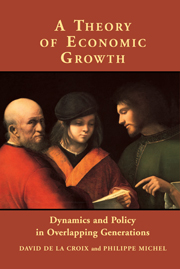4 - Debt
Published online by Cambridge University Press: 29 October 2009
Summary
Government debt allows the financing of public spending or transfer policies. Issuing debt (for one period in our setup) implies that the government has to pay interest and eventually to reimburse the principal. This can be done in two different ways: if one taxes the future generations to reimburse the debt, the policy amounts to performing an inter-generational transfer. If the government issues new debt in order to reimburse the preceding debt, then the question of the sustainability of such a policy becomes central.
The effect of government debt on growth and welfare is an old debate. According to the view of Ricardo (1817), “it is not by the payment of the interest on the national debt that a country is distressed, nor is it by the exoneration from payment that it can be relieved. It is only by saving from income, and retrenching in expenditure, that the national capital can be increased; and neither the income would be increased, nor the expenditure diminished by the annihilation of the national debt.” This famous neutrality result holds in the basic neoclassical growth model but breaks down in the overlapping generations model of Diamond (1965), Phelps and Shell (1969), and Blanchard (1985), in which finite-lived agents consider government debt as net wealth (Barro (1974)). As pointed out by Weil (1989), it is not the assumption of a finite horizon which is responsible for the breakdown of the Ricardian equivalence, but the presence of unborn future generations whose interests are not taken into account by present generations.
- Type
- Chapter
- Information
- A Theory of Economic GrowthDynamics and Policy in Overlapping Generations, pp. 179 - 237Publisher: Cambridge University PressPrint publication year: 2002



